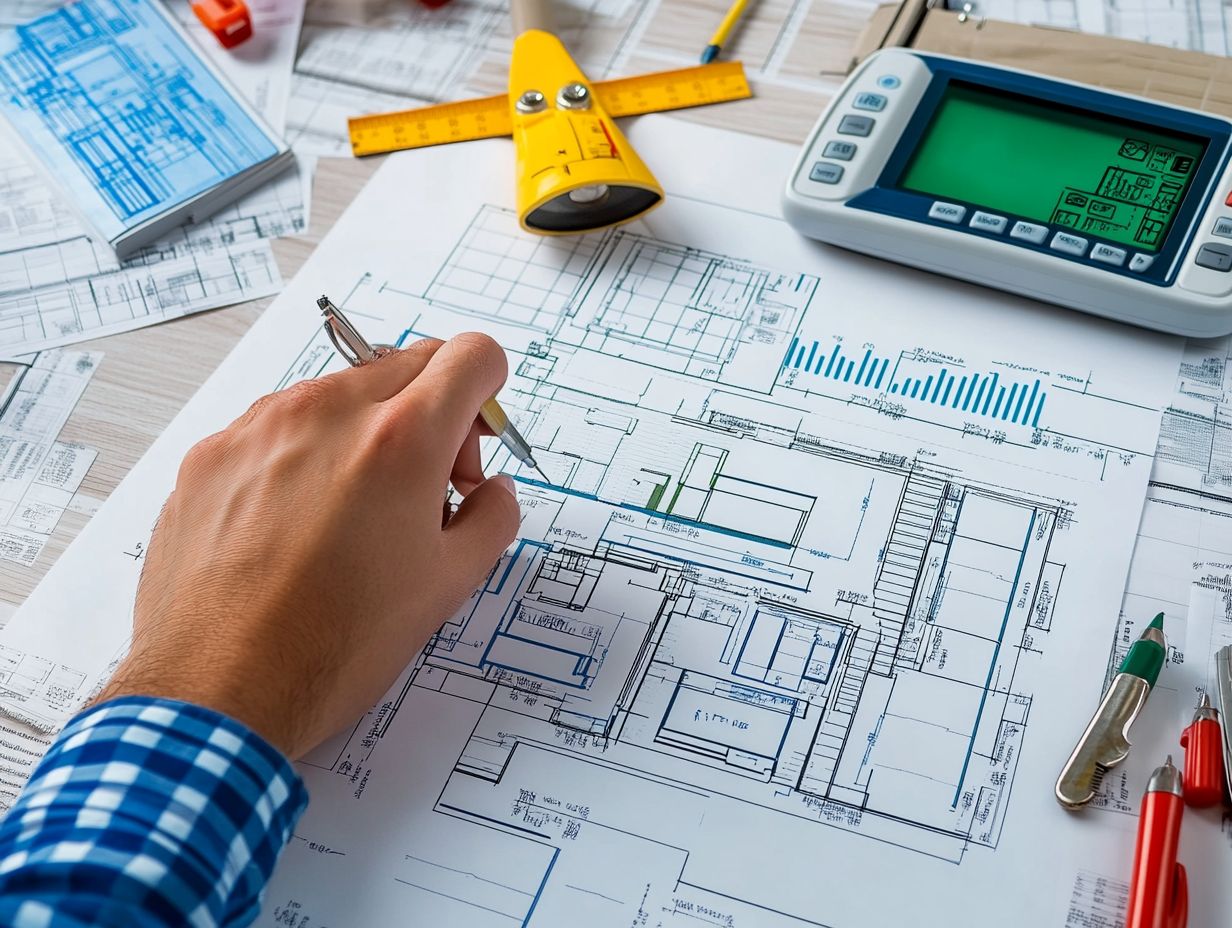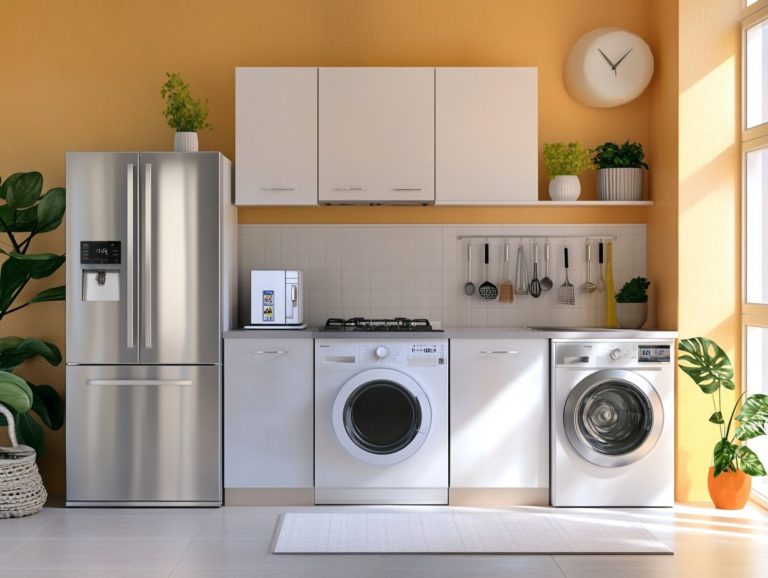5 Key Considerations for Energy Audits
In today s landscape, energy efficiency is now a must-have for every homeowner and business! It’s a necessity for homeowners and businesses aiming to reduce costs while minimizing their environmental impact.
An energy audit acts as a vital first step in this journey, pinpointing areas where improvements can be made and potential savings can be realized.
This guide delves into the essential elements of energy audits, from grasping their purpose and choosing the right auditor to executing changes and tracking your progress.
Whether you’re just starting to explore the concept or seeking to enhance your existing approach, this guide will empower you to make informed decisions about energy efficiency.
Contents
- Key Takeaways:
- 1. Understanding the Purpose of an Energy Audit
- 2. Choosing the Right Auditor
- 3. Preparing for the Audit Process
- 4. Evaluating the Results and Recommendations
- 5. Implementing Changes and Monitoring Progress
- What Is an Energy Audit and Why Is It Important?
- What Are the Different Types of Energy Audits?
- What Qualifications Should an Energy Auditor Have?
- What Information Should Be Gathered Ahead of the Audit?
- How Can a Business or Homeowner Prepare for an Energy Audit?
- What Factors Should Be Considered When Choosing Energy-Efficient Upgrades?
- How Can One Monitor and Track Energy Usage After Implementing Changes?
- What Are the Potential Cost Savings of an Energy Audit?
- What Are Some Common Recommendations Made by Energy Auditors?
- How Often Should an Energy Audit Be Conducted?
- Frequently Asked Questions
- What are the 5 key considerations for energy audits?
- Why is it important to identify the scope of the energy audit?
- What type of data is needed for an energy audit?
- What does an on-site evaluation entail?
- How are energy-saving measures recommended in an energy audit?
- Why is tracking and reporting on progress essential after an energy audit?
- Energy Audit Insights
Key Takeaways:
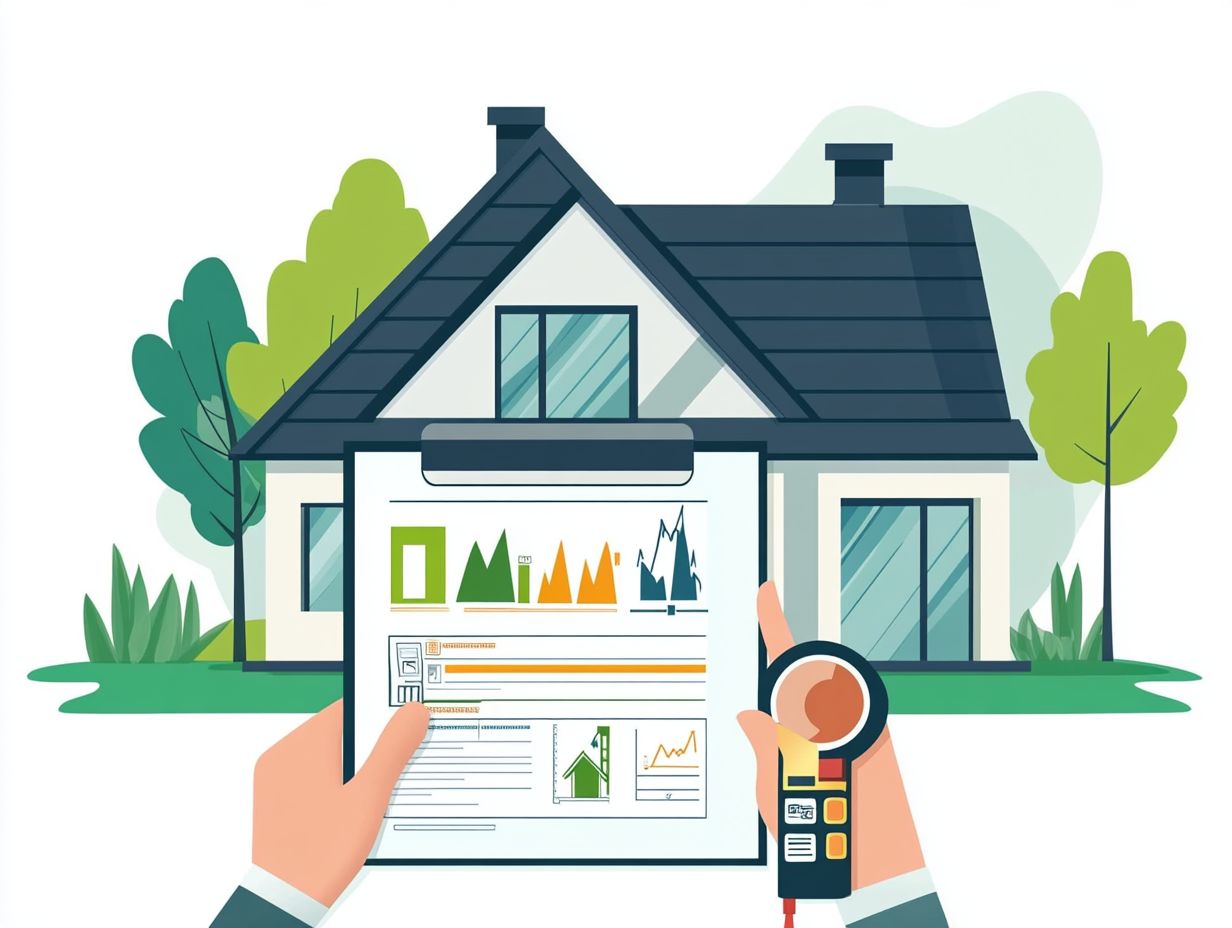
Understanding the purpose of an energy audit is crucial for its success and effectiveness.
Choosing the right auditor with the proper qualifications is essential for accurate and comprehensive results.
Preparation and gathering of information prior to the audit can greatly improve the efficiency and accuracy of the process.
1. Understanding the Purpose of an Energy Audit
Understanding the purpose of an energy audit is essential for you as a homeowner looking to boost your home s energy efficiency and enhance your overall comfort.
An energy audit is your starting point for uncovering energy consumption patterns and identifying potential improvements, giving you the power to make informed decisions about efficiency upgrades and energy solutions.
By engaging certified auditors from the Building Performance Institute (BPI), you ll gain valuable insights into the way your home keeps heat in and cold out. You’ll also pick up practical energy-saving tips and significantly reduce your carbon footprint plus, you can take advantage of energy incentives offered by local utilities like Efficiency Vermont and Vermont Gas.
This evaluation helps you check your home’s energy performance by pinpointing areas where energy escapes, such as through drafty windows or insufficient insulation.
It also helps you analyze specific energy consumption trends over time, so you can spot any unusual spikes in usage that might indicate inefficiencies.
Identify energy-saving opportunities to unlock savings. Sealing ducts or upgrading to energy-efficient appliances can significantly lower your monthly bills.
Not to mention, these audits improve overall comfort by addressing issues like inconsistent temperatures and enhancing indoor air quality all crucial for creating a more inviting living space.
2. Choosing the Right Auditor
Choosing the right energy auditor is crucial for a comprehensive energy assessment that reveals 5 key steps in conducting energy audits tailored to your home or business.
The right qualifications can significantly enhance the quality of the assessment. An effective energy auditor typically holds certifications such as those from the Building Performance Institute (BPI), which attests to their proficiency in conducting detailed evaluations.
Practical experience in diagnostic testing is essential, enabling them to accurately identify energy inefficiencies. It’s also vital for the auditor to grasp the specific energy solutions relevant to your local environment, especially in regions like Vermont, where climate heavily influences energy consumption.
3. Preparing for the Audit Process
Get ready for your energy audit! Gather key information now to maximize your savings. You’ll need to collect some key information about your home’s energy consumption, utility bills, and any previous energy improvements you’ve made. For a comprehensive understanding, refer to an overview of the home energy audit process.
To make this easier, create a checklist that includes recent utility bills ideally from the past year to paint a clear picture of your energy costs. Documenting any upgrades you ve made, like insulation improvements, window replacements, and energy-efficient appliances, will highlight your commitment to sustainability.
Keeping detailed records of your energy-related expenses can also help in identifying patterns and pinpointing areas that could use a little enhancement. By assembling this data, you ll ensure that the audit provides precise measurements, leading to tailored recommendations that can elevate your overall energy efficiency.
4. Evaluating the Results and Recommendations
Evaluar los resultados y recomendaciones de su auditor a energ tica es un paso esencial para optimizar el rendimiento energ tico de su hogar. Este paso le ayuda a implementar medidas efectivas para ahorrar energ a.
Al interpretar cuidadosamente los indicadores clave proporcionados en el informe de auditor a, puede descubrir oportunidades significativas para el ahorro de energ a.
Por ejemplo, la auditor a podr a revelar reas donde ocurren fugas de aire. Sellar las brechas alrededor de ventanas y puertas puede mejorar considerablemente el envolvente t rmico de su hogar.
Recomendaciones incluyen agregar aislamiento en ticos o s tanos para reducir a n m s la p rdida de energ a.
Tambi n es crucial evaluar la eficiencia de sus sistemas de calefacci n y refrigeraci n existentes. Actualizar a modelos de alta eficiencia puede generar ahorros sustanciales a largo plazo.
Tome estos pasos pr cticos hoy! No solo mejora su comodidad, sino que tambi n contribuye a un entorno m s sostenible.
5. Implementing Changes and Monitoring Progress
Implementar cambios basados en las recomendaciones de su auditor a energ tica es esencial para lograr ahorros a largo plazo. Monitorear su progreso de manera efectiva requiere un enfoque estructurado.
Para comenzar, establezca un sistema de gesti n energ tica que rastree meticulosamente sus patrones de consumo energ tico. Este sistema le permitir identificar reas espec ficas que necesitan atenci n.
Usar herramientas como c maras infrarrojas puede ayudar a visualizar la p rdida de energ a y descubrir problemas ocultos como aislamiento inadecuado o fugas de aire. Realizar pruebas con puertas de soplado mide la estanqueidad de su estructura, destacando reas donde se desperdicia el intercambio de aire.
Al comprometerse con estos pasos, puede mejorar su eficiencia y contribuir a un futuro m s sostenible.
What Is an Energy Audit and Why Is It Important?
Una auditor a energ tica es una evaluaci n exhaustiva dise ada para valorar el rendimiento energ tico de su hogar y descubrir oportunidades para mejorar la eficiencia. Esto es esencial para los propietarios que buscan minimizar costos energ ticos y aumentar el confort.
Al examinar datos del edificio y realizar pruebas diagn sticas como evaluaciones de puertas de soplado e inspecciones con c maras infrarrojas, los auditores energ ticos pueden ofrecer soluciones personalizadas que reduzcan significativamente sus facturas de energ a y mejoren su comodidad general.
Estas auditor as no solo rastrean el consumo de energ a; tambi n sientan las bases para una mejora continua. Las metodolog as empleadas incluyen evaluar:
- Niveles de aislamiento
- Fugas de aire
- Aparatos obsoletos
Identificando estas reas, puede tomar decisiones informadas sobre mejoras y cambios que no solo le ahorrar n dinero, sino que tambi n ayudar n a reducir su huella de carbono. A trav s de recomendaciones estrat gicas, el proceso cultiva un sentido de responsabilidad ambiental y mejora la durabilidad de su hogar.
What Are the Different Types of Energy Audits?
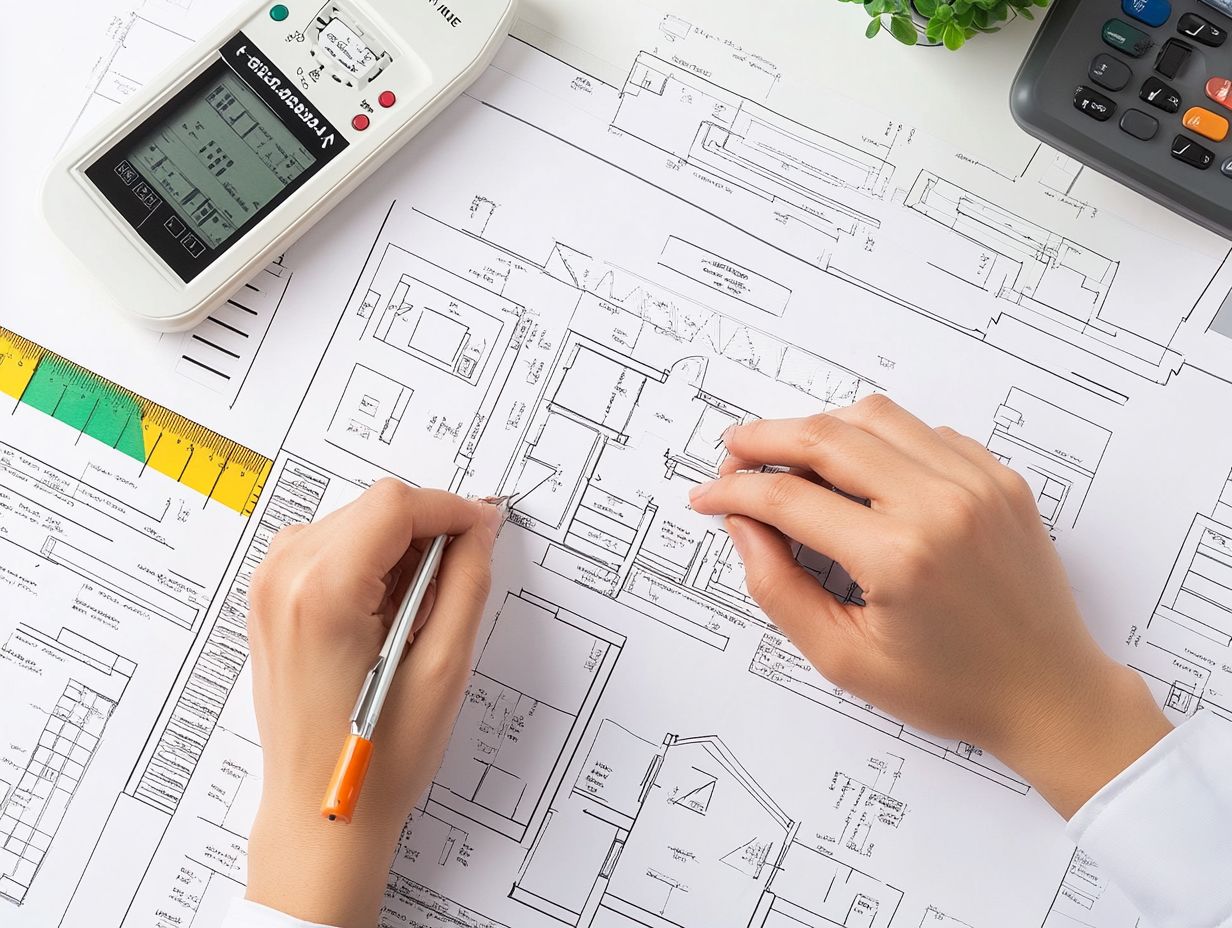
Existen varios tipos de auditor as energ ticas, cada una dise ada para satisfacer sus necesidades y objetivos nicos. Estos van desde evaluaciones simples hasta an lisis detallados alineados con est ndares energ ticos regulatorios.
Estas auditor as son invaluables, ya sea que sea un propietario que busca reducir las facturas de energ a o un negocio que se esfuerza por cumplir con regulaciones ambientales. Las auditor as preliminares ayudan a detectar ineficiencias obvias, ofreciendo una visi n r pida de los ahorros potenciales, mientras que las auditor as detalladas examinan en profundidad los patrones de consumo energ tico de su propiedad.
Para proyectos a gran escala, las auditor as de grado de inversi n ofrecen una abundancia de datos e informaci n financiera esenciales. Entender qu tipo de auditor a se adapta mejor a sus necesidades puede ahorrarle dinero ahora y contribuir a sus objetivos de sostenibilidad a largo plazo.
What Qualifications Should an Energy Auditor Have?
The qualifications of an energy auditor are essential for conducting a thorough and effective energy assessment. BPI Certification is often regarded as the gold standard in the industry.
In addition to this certification, aspiring auditors typically pursue specialized training in energy management principles. This training arms them with a detailed knowledge of systems performance and energy use metrics. Such comprehensive knowledge is vital for spotting inefficiencies and recommending impactful solutions tailored to your needs as a homeowner.
Practical experience in the field further sharpens their ability to analyze a diverse range of structures. This allows them to navigate the unique challenges and opportunities each home presents. A well-rounded auditor stays current with the latest energy efficiency technologies, giving them the power to make informed recommendations that deliver both cost savings and sustainability benefits for households like yours.
What Information Should Be Gathered Ahead of the Audit?
Before you embark on an energy audit, gather relevant information such as recent utility bills, details of previous energy improvements, and specific energy consumption patterns. Following the best practices for conducting energy assessments improves the evaluation and makes the audit process smoother.
You should compile a set of documents that includes:
- Historical utility bills for at least the past year
- Records of any past energy assessments or audits
Consider including receipts or warranties for energy-efficient appliances or upgrades you’ve made. Presenting this information upfront gives the auditor valuable insight into your household’s energy usage trends. This enables them to identify potential improvements and ultimately deliver a more accurate and effective analysis tailored to your home s specific needs.
How Can a Business or Homeowner Prepare for an Energy Audit?
Get ready for a successful energy audit by organizing all relevant documents, scheduling the audit at a convenient time, and ensuring that every area of your property is accessible for assessment. For more assistance, check out these local experts for energy audits.
To make the process even smoother, take the time to clean and declutter your spaces. This will allow auditors to easily reach critical appliances and systems that significantly impact energy consumption, such as your heating and cooling units. For more tips, consider 5 ways to prepare for an energy audit and ensure light fixtures and electrical panels are easily accessible as well.
Informing everyone in your household or staff about the upcoming audit is essential. This fosters cooperation and helps each person understand their role in the process.
Reviewing previous utility bills can provide valuable insights into consumption patterns, highlighting potential areas where you could improve efficiency.
What Factors Should Be Considered When Choosing Energy-Efficient Upgrades?
When you’re considering energy-efficient upgrades, there are several key factors to think about to ensure the choices you make will truly enhance energy performance, lower energy costs, and elevate your living comfort. Learning how to make energy audits work for you can be a valuable part of this process.
Evaluate the initial investment against the long-term savings these improvements can provide. It s crucial to analyze how well these upgrades will fit with your current systems; any misalignment could undermine the benefits you re hoping to achieve.
Exploring various opportunities for energy savings may uncover substantial financial advantages over time. Engaging an energy auditor can be a game-changer in this journey; their expert guidance will help you pinpoint the most efficient solutions tailored to your specific needs, maximizing both your immediate gains and future returns on investment.
How Can One Monitor and Track Energy Usage After Implementing Changes?
Monitoring and tracking your energy usage after making upgrades is essential for grasping how effective those energy-efficient changes really are. It allows you to make timely adjustments as needed.
Utilizing an energy management system helps you monitor and control your energy usage effectively. This can significantly simplify the tracking process, offering insights into consumption patterns that you might otherwise miss. Conducting periodic energy assessments will serve as invaluable checkpoints, enabling you to review the data collected and pinpoint areas that need improvement.
By diving into this energy data, you can uncover trends and anomalies that highlight opportunities for further optimization. This approach boosts your energy performance and keeps efficiency high!
What Are the Potential Cost Savings of an Energy Audit?
The potential cost savings from an energy audit can be remarkably significant. Uncovering inefficiencies often translates into lower utility bills and reduced energy consumption.
Consider a recent case study conducted by a local utility company. A residential property underwent a comprehensive energy audit. After enhancing its insulation and swapping out outdated appliances, the homeowners enjoyed a remarkable 30% reduction in their monthly energy expenses. This translated to over $300 in annual savings.
When you engage in energy audits for your business, you will often uncover opportunities to implement smarter lighting solutions or programmable thermostats. These pave the way for even more impressive savings.
Statistics show that companies can reduce operational costs by up to 25% simply by using energy more wisely.
What Are Some Common Recommendations Made by Energy Auditors?
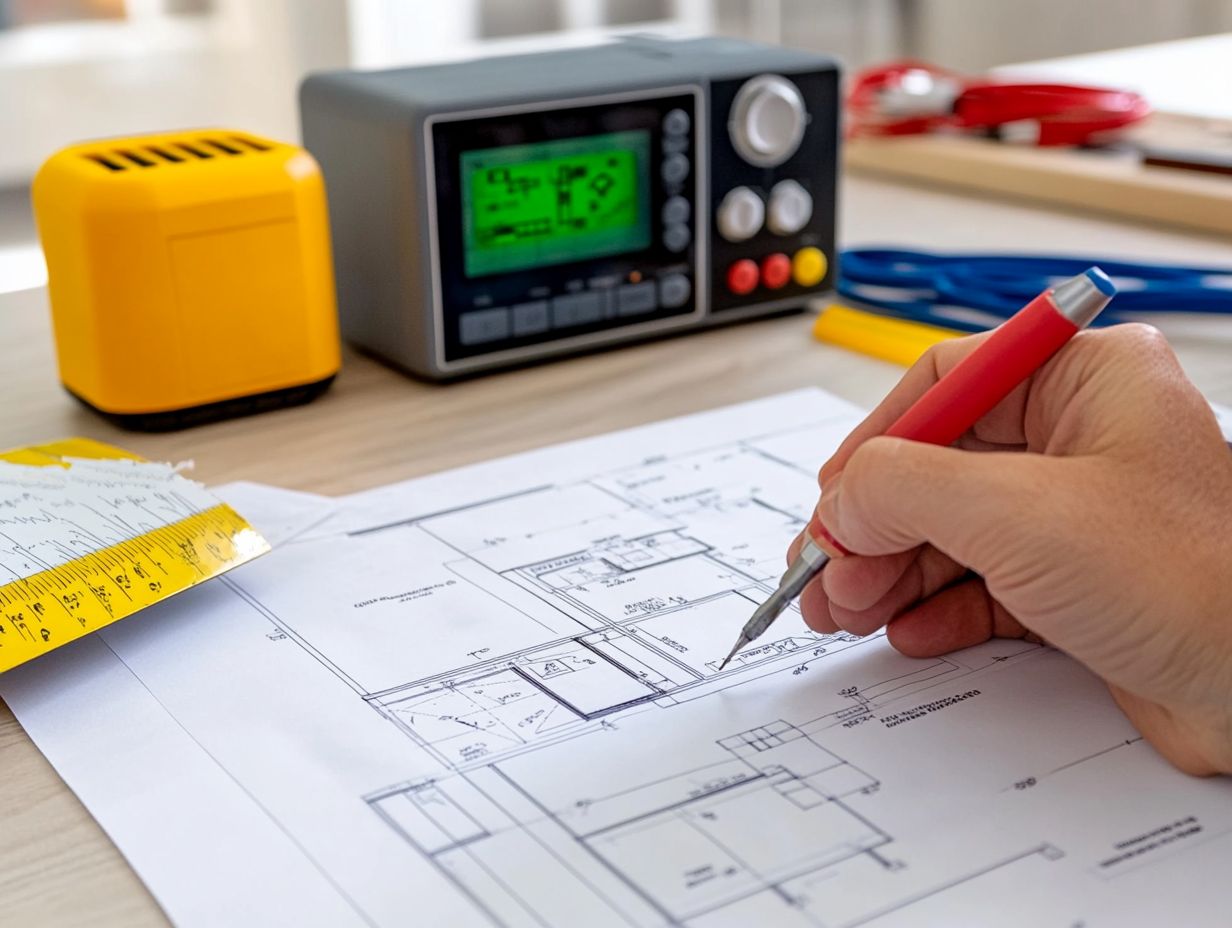
Energy auditors frequently offer a range of insightful recommendations designed to enhance energy efficiency and trim energy costs. These significantly boost your home’s overall energy performance.
Recommendations often start with essential weatherization work that seals leaks and minimizes air infiltration. This ensures your conditioned air stays right where it belongs inside.
Improving insulation is equally vital. A well-insulated home keeps warmth in during winter and cool air in during summer. This creates a more comfortable living space while slashing energy bills.
Upgrading to more efficient heating, ventilation, and air conditioning systems can truly make a difference. These modern models consume less energy to maintain your desired temperature.
Incorporating energy-efficient appliances throughout your household not only curbs electricity consumption but can also lead to impressive long-term savings.
When implemented together, these strategies align with opportunities for energy savings. They help you reduce your carbon footprint while embracing a sustainable lifestyle.
How Often Should an Energy Audit Be Conducted?
Conducting an energy audit regularly is essential for maintaining optimal energy performance. It ensures continued efficiency in your home or business.
Experts suggest you schedule these audits every three to five years. For optimal results, familiarize yourself with the best practices for conducting energy audits and make sure to check your energy use regularly, especially when significant changes occur, such as major renovations or shifts in your consumption patterns.
By doing this, you can detect potential inefficiencies and implement effective strategies for improvement. This proactive approach enhances your energy management and fosters a sustainable environment while potentially reducing your utility costs.
Ultimately, staying informed about your energy performance protects your investment and promotes a more comfortable living or working space.
Frequently Asked Questions
What are the 5 key considerations for energy audits?
The 5 key considerations for energy audits are:
- Identifying the scope of the audit
- Gathering energy usage data
- Conducting on-site evaluations
- Recommending energy-saving measures
- Tracking and reporting on progress.
Why is it important to identify the scope of the energy audit?
Identifying the scope of the energy audit is crucial. It helps determine the specific areas and systems that will be evaluated, allowing for a more focused and efficient audit process.
What type of data is needed for an energy audit?
Energy usage data from the past 12-24 months is typically needed. This includes utility bills, energy consumption records, and other relevant data to provide a comprehensive analysis.
What does an on-site evaluation entail?
An on-site evaluation involves inspecting the building and its energy systems. This helps identify any potential sources of energy waste or inefficiency, including HVAC systems, lighting, insulation, and building envelope.
How are energy-saving measures recommended in an energy audit?
Energy-saving measures are recommended based on the findings of the audit. This considers the specific needs and goals of the building. Recommendations may include upgrades to energy-efficient equipment, implementing energy management systems, or improving the building envelope.
Why is tracking and reporting on progress essential after an energy audit?
Tracking and reporting on progress ensure that the energy-saving measures are effectively implemented. It helps in evaluating performance and making necessary adjustments over time.
Energy Audit Insights
Tracking progress shows how effective your energy-saving measures are. It also highlights areas for improvement.
Energy usage data from the past 12-24 months is typically needed for an energy audit. This includes utility bills and energy consumption records.
An on-site evaluation involves inspecting the building and its systems. This includes checking for energy waste in HVAC (Heating, Ventilation, and Air Conditioning) systems, lighting, and insulation.
Energy-saving measures are based on the audit’s findings and the building’s specific needs. For more detailed insights, consider understanding energy audits, as recommendations might include upgrading to energy-efficient equipment or improving the building’s envelope.
Tracking progress is essential after an energy audit. It helps you see if the measures are working and allows for comparisons to past energy use.
